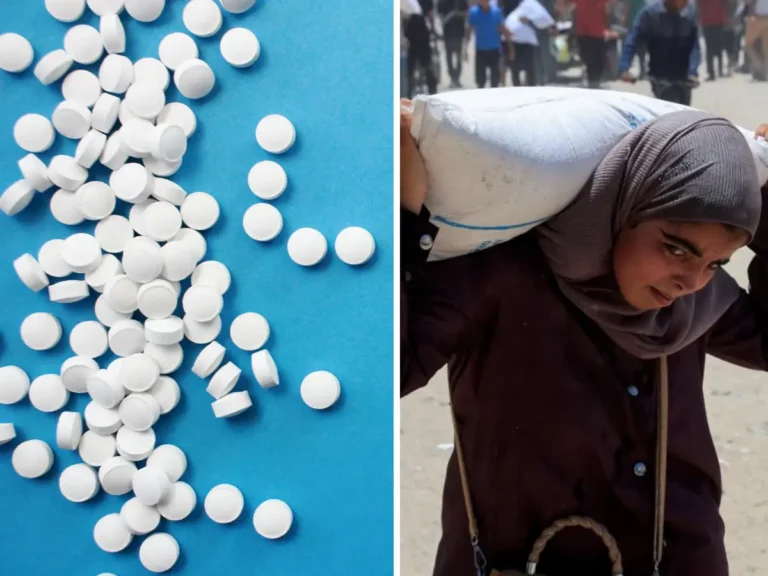A serious health and political crisis has emerged in Gaza following claims that opioid pills were found inside flour bags meant for aid distribution. The flour was part of a humanitarian shipment provided by a Gaza-based aid foundation reportedly approved by Israeli authorities and backed by the United States. The discovery has raised global alarms over both public health safety and the intention behind the relief effort.
The report first came from local media sources in Gaza, which accused the aid foundation of hiding the opioid medication inside the flour. The pills were identified as OxyContin, a potent painkiller typically prescribed to cancer patients and individuals suffering from severe, unmanageable pain.
Health experts explain that OxyContin is an opioid derived from the poppy plant and is highly addictive. If taken without a prescription or in large doses, it can lead to hallucinations, breathing problems, and even death. The medication is known for causing strong physical and mental dependence when misused.
Medical professionals warn that without proper dosage and supervision, OxyContin use may result in serious side effects. These include confusion, nausea, severe constipation, and suppression of breathing. In some cases, individuals can lose consciousness or suffer fatal respiratory failure. This has sparked fears that the hidden pills could create a public health disaster in Gaza, especially among the young population.
According to media reports, these drugs were found in flour distributed through a network associated with the Gaza Humanitarian Foundation. The foundation has been under scrutiny in the past due to safety concerns during aid deliveries. Local sources say the situation has reached a breaking point as trust in aid groups continues to erode.
The Palestinian health ministry expressed deep concern and condemned the act, calling it a direct attack on public health. Officials believe this could be a deliberate attempt to harm the social structure of Gaza and weaken the community from within. They fear the distribution of addictive drugs could lead to widespread mental health issues, unemployment, and increased crime.
Over the past month, more than 500 Palestinians reportedly died while attempting to collect aid, according to statistics from Gaza’s health authorities. These deaths occurred in or near distribution centers. Many people risk their lives just to receive basic food items like flour and oil. The situation is already dire due to ongoing blockades, infrastructure damage, and a collapsed health care system. The added concern of possible drug contamination in food aid has only worsened the humanitarian crisis.
Middle East-based journalists are calling for an international investigation. They urge the involvement of independent watchdogs and humanitarian bodies to assess whether this was a case of neglect or a deliberate strategy. The reports highlight that only professional medical staff should handle medications like OxyContin, and it should never appear in public food supplies.
Several international human rights organizations have expressed shock over the incident. They emphasized the need to maintain humanitarian neutrality in conflict zones. They also questioned how such a strong prescription drug made its way into food aid. Experts say if these reports are verified, it would represent a serious violation of humanitarian principles and medical ethics.
Meanwhile, the foundation responsible for the flour distribution has not released a public statement addressing the allegations. Humanitarian groups across the world are watching closely as the story develops. Many are now reviewing their own protocols to ensure the safety and transparency of aid deliveries in conflict regions.
This incident has triggered discussions on the importance of monitoring and vetting organizations involved in aid work. It also raised concerns about political manipulation of relief efforts in war zones. The people of Gaza continue to face not just violence and poverty, but now a new and unexpected threat hidden inside essential supplies.
Calls are growing louder for independent inspection of all incoming aid to Gaza. Local leaders and international observers demand better oversight and clearer accountability from groups operating under the name of humanitarian support. While the truth behind the opioid discovery is still being investigated, the damage to public trust is already evident.
The people of Gaza are now left to wonder whether the food they receive is safe. As conflict continues and humanitarian needs grow, the world is reminded of the delicate balance between saving lives and risking further harm through careless or malicious actions in the name of aid.







